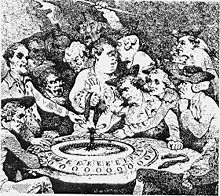Even and Odd

Even and Odd is a simple game of chance that consists of picking up various coins or other small objects, closing the latter and letting someone else guess whether the number of the same is an even or an odd one.
history
This game was already known to the Greeks ( artiazein ) and the Romans ( ludere par impar ). In the Krünitz Lexicon of 1858 it says: "The game even or odd was very common with the Romans, and was either made with talis, tesseris, or money, which is" alea maior ", or with nuts, beans and almonds, which is" alea minor. " "was called, played."
A medieval mention is found in Renner of Hugo von Trimberg (vs. 2695).
This game is also similar to the finger game Morra or Fingerlos , where you quickly insert or stretch out a number of fingers and, by keeping your hand hidden, let someone else guess the number.
Even and odd are on the list of prohibited games of the Imperial and Royal Ministry of Justice from 1904.
Adaptation
Under the name odd and even (Engl. Even-Odd or short EO ), a precursor of is Roulette game in the 18th century known in bets on Pair or Impair this early form lives on in the modern roulette.